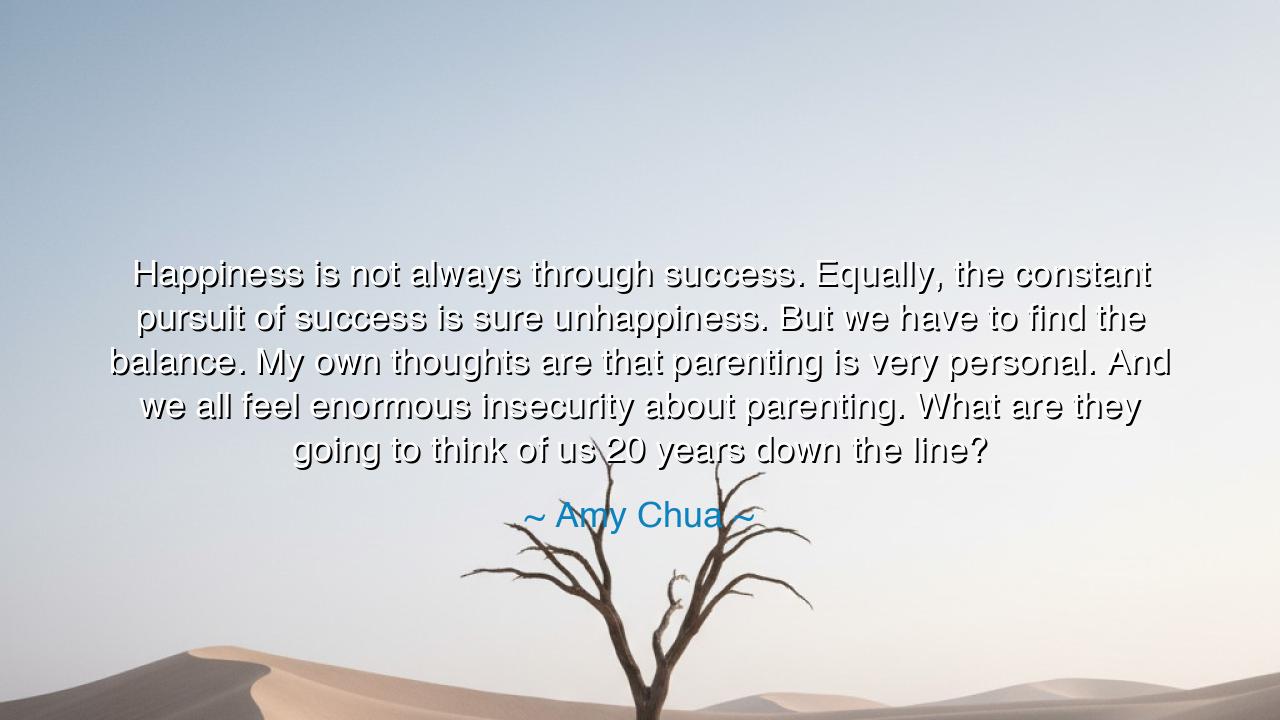
Happiness is not always through success. Equally, the constant
Happiness is not always through success. Equally, the constant pursuit of success is sure unhappiness. But we have to find the balance. My own thoughts are that parenting is very personal. And we all feel enormous insecurity about parenting. What are they going to think of us 20 years down the line?






Hearken, O seekers of balance, to the reflective words of Amy Chua, who declares: “Happiness is not always through success. Equally, the constant pursuit of success is sure unhappiness. But we have to find the balance. My own thoughts are that parenting is very personal. And we all feel enormous insecurity about parenting. What are they going to think of us 20 years down the line?” In this utterance lies the trembling heart of every parent: the tension between success and happiness, the weight of insecurity, and the haunting vision of how our children will judge us when they are grown.
The origin of this insight rests in Chua’s life as both scholar and mother, for she became known worldwide through her writings on “Tiger Parenting,” emphasizing discipline and achievement. Yet in this statement she reveals a deeper truth learned through experience: that relentless striving for success—while sometimes fruitful—can drain the soul of joy. She reminds us that happiness and success are not the same, and that to chase the latter without pause is to court sorrow. This wisdom, though born of modern reflection, echoes ancient philosophy, for Aristotle too taught that virtue and balance, not raw achievement, were the true foundations of the good life.
History provides us an illuminating example in the life of Marcus Aurelius, the philosopher-emperor. He carried the burden of empire, seeking success in governance, war, and law, yet his writings in Meditations betray his fear of legacy: how would his children, his people, and the generations to come judge him? Despite his triumphs, he struggled with the very insecurity Chua describes. Success could not shield him from doubt, for even emperors ask: “Will my children honor me, or resent me?”
The emotional resonance of Chua’s words is profound. Parenting is deeply personal, for it exposes the rawest fears of the human heart. Every parent wonders if they have loved enough, guided enough, or been enough. The sleepless thought—“what will they think of us years from now?”—echoes across centuries, for parents are judged not only by the world but by their own offspring. And unlike the trophies of success, which can be displayed for all to see, the verdict of one’s children remains hidden until time reveals it.
Practically, her words teach us that the path forward lies in balance. To neglect discipline and guidance is to fail in preparing children for life’s demands. Yet to demand constant achievement, stripped of joy, is to burden them with chains that suffocate love. True wisdom lies in weaving the two together: teaching children resilience and effort, but also laughter, tenderness, and the freedom to be imperfect. Balance becomes not only the method of parenting but also its greatest gift, for children who grow in balanced homes learn to balance their own lives.
Her words also carry a heroic dimension, for to admit insecurity requires courage. Many would mask their doubts, yet Chua reveals that even the strongest and most deliberate parents carry fear within them. This honesty becomes a beacon for others, reminding us that doubt is not weakness, but a sign of care. Only those who love deeply wonder how they will be remembered. In this way, the very insecurity of parents is proof of their devotion.
From this reflection emerges a lesson for all generations: seek not to raise children into mere trophies of success, nor to shelter them from the demands of life. Instead, strive to live with balance, to love with consistency, and to teach through example. Accept that doubt will remain, and let it humble rather than paralyze you. For when your children look back twenty years hence, they will not remember only your rules or your achievements, but the spirit of your love, the balance of your guidance, and the humanity you revealed in your imperfections.
Thus, the teaching of Amy Chua endures: happiness and success are not the same, parenting is personal, and insecurity is inevitable. Let this wisdom be carried forward: that in the sacred task of raising children, perfection is an illusion, but sincerity, balance, and love are eternal.






AAdministratorAdministrator
Welcome, honored guests. Please leave a comment, we will respond soon